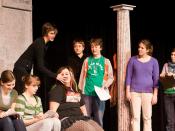Lysistrata "There is no beast as shameless as a woman" Aristophanes was a craft comedy poet in the fourth century B.C. during the time of the Peloponnesian War. Aristophanes' usual style was to be satirical, and suggesting the eccentric. The most absurd and humorous of Aristophanes' comedies are those in which the main characters, the heroes of the story, are women. Smart women. One of the most famous of Aristophanes' comedies portraying powerfully capable women is Lysistrata, named after the female lead character of the play. It depicts Athenian Lysistrata and the women of Athens teaming up with the women of Sparta to force their husbands to conclude the Peloponnesian War. The play is a comedy, which appears to be written for the amusement of men. The play can be seen as a historical reference to ancient Greece, but it seems highly unlikely that women would talk with such a crude sexual tone.
Instead Lysistrata is strictly a satirical play written maybe even to make men doubt the innocence of a woman.
If women were such beasts as Euripides stated then would women have managed to seize the Acropolis, and prevented the men from squandering them further on the war. Euripides might have referred to the vulgarity of the women's thoughts and language: "It's a sair thing, the dear knows, for a woman tae sleep alone wi'oot a prick - but we maun do it, for the sake of peace" The language of the women is, as mentioned earlier, strictly for the humor. For Euripides to make such a quote seems rather incorrect. It is to a certain extent the men who are the shameless beasts who beat their wives and fight senseless wars.
Lysistrata, on the contrary shows women acting bravely and even aggressively against men...


